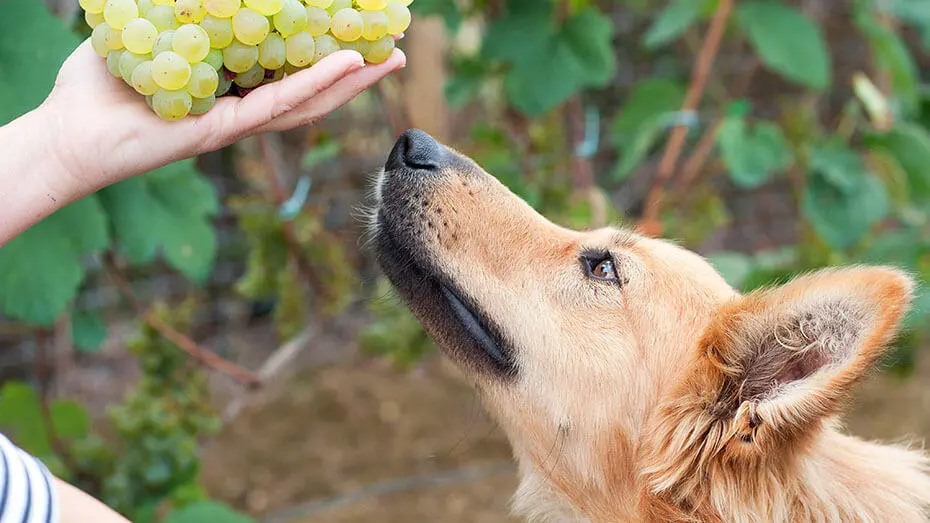It’s not a good idea to feed your dog scraps from your plate. Grapes are the perfect illustration of why you can’t assume that something is safe for your dog simply because it’s okay for you and I to eat it. To learn more about the dangers of grapes for canines, please read on.
Grapes do dogs eat them?
Grapes are very poisonous to dogs, therefore you should never give them to your dog and keep them away from any grapes you may have lying about. Dogs shouldn’t eat grapes or raisins because they might choke. No matter what kind of dog you have or how much it ate, this is always the case. Your dog should stay away from anything made from grapes since scientists haven’t pinpointed the specific toxin in grapes that is harmful to canines.
To what extent can grapes cause poisoning in canines, and what symptoms could one expect to see?
No, grapes are not safe for canines to eat. However, if you suspect your pet has self-medicated, you should take them to the doctor immediately, even if they are displaying no signs of illness. Grape or raisin poisoning symptoms include:
- Vomiting
- Diarrhoea
- Lethargy
- Panting and dry nose as symptoms of dehydration
- Difficulty breathing
- Excessive thirst
Do not delay in contacting your vet, as your dog could develop serious health problems such a kidney failure.
Why do certain canine companions seem to be able to enjoy grapes without experiencing any of the typical poisoning signs?
There are several reasons why you shouldn’t believe your dog is immune to grape poisoning, regardless of whether it has eaten grapes before with no apparent ill effects or you have heard of owners giving their dog one or two grapes as a treat.
To begin, there is still a gap in our understanding of why grapes are so poisonous to canines. Some dogs become sick after eating only one grape, while others may consume quite a few without any ill effects, making the proper dosage somewhat of a mystery. It’s not a good idea to experiment with your dog to see what the toxic dosage might be, as this amount may vary from dog to dog.
You shouldn’t think your pet is immune to poisoning just because it doesn’t display any immediate symptoms. There may be a lag between when the problem first manifests and when you notice it, and by that time, your pet might be in serious danger. This is why you shouldn’t wait for symptoms to appear before calling your vet if you catch your dog eating grapes. Your dog has a higher chance of avoiding permanent damage if you act quickly.

How to prevent dogs from having grapes?
Now that you know the answer to the question ‘are grapes toxic to dogs?’, you’re probably keen to find out how to keep your dog away from the troublesome fruit. Here are a few tricks you can try.
It’s imperative that grapes be kept out of reach.
It’s not recommended to feed grapes to canines, yet they’re totally OK for human consumption. As long as you store grapes and raisins in the fridge or a high cabinet, you shouldn’t have to worry about your pet getting into them.
Do not leave any grapes on the floor.
Before leaving a bunch of grapes to dry or set on the table, you should double check to make sure none have fallen to the floor. Even with raisins, this is true.
Look out for items that have grapes or raisins in them.
It’s not a good idea to give your dog human treats like mince pies or fruit cakes. Raisins and chocolate are two common examples of components found in foods that may be harmful to dogs.
After you go home, put your purchases away.
Sometimes when you go home with a bag full of groceries, your dog may be anxious to investigate, and in the process, he or she may rip open the bag of dried fruit or grapes. For this reason, remember to empty your shopping bags immediately upon returning home and store grapes and raisins in a location that is inaccessible to your pet.
Spread the word around your loved ones that grapes might be poisonous.
Don’t only tell the adults not to give grapes to the dog; make sure the youngsters know not to do it, too.
Substitute a non-toxic apple for your dog.
The dog’s attention may be hard to divert from the bowl of fruit on the kitchen counter. Fruits like blueberries, oranges, and strawberries are better options if your dog is craving something sweet. Due to the high sugar content, they should be given to dogs sparingly to prevent health issues including obesity and tooth decay.